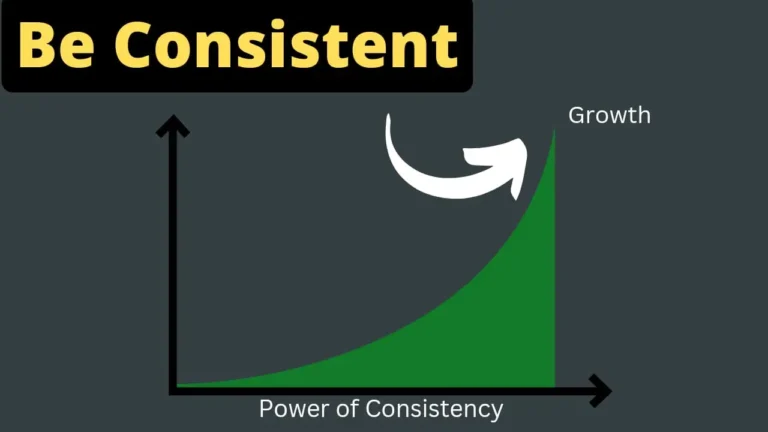
Have you ever thought about writing a journal in your life? Many people start to write a journal but they quit in weeks or months because they find it boring and time-wasting.
But you’re wrong!
The benefits that you get by journaling your life are numerous. As I said, many people quit because they don’t know how to write a journal effectively.
No Problem!
We are here to tell you how to write a journal and change your life. Journal is a detailed analysis and management of the personal and professional events that took place in our lives. We record those experiences in a book.
Let’s understand how to write a journal in 12 simple and easy tips.
Table of Contents
12 Simple Tips To Write A Journal
1: Get A Physical Book
Many people think that journaling in online notes app will make them productive but it’s a false belief. Even though writing a journal in apps may take less time but the experience you’ll get from writing with your own hands is inexpressible.

The real benefits that you get from journaling are when you write on a physical book with your own hands. Get a physical book to write a journal today.
2: Divide Into 4 Categories
Now you have a physical book. The next thing you need to do is to divide the book into four categories:
- Affirmations
- Habit Tracker
- Finance Management
- Daily Experience
If you journal these categories in your physical book within a month you can see visible results in your life.
Let us understand these categories in detail:
Affirmations
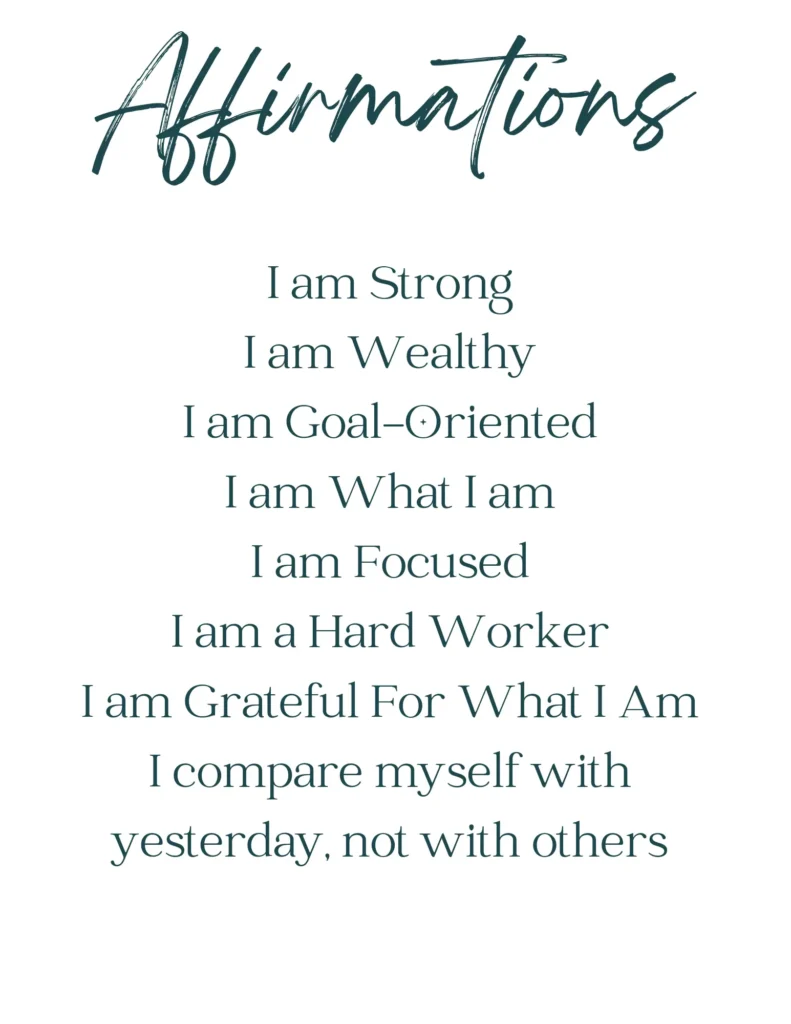
If you start your day with positive affirmations then your entire day will be spread with positive thoughts and you sprinkle positive vibes everywhere.
This happens if you practice affirmations effectively and with a belief that they work.
Some of the affirmations are:
- I am Strong
- I am Wealthy
- I am Goal-Oriented
- I am What I am
- I am Focused
- I am a Hard Worker
- I am Grateful For What I Am
- I compare myself with yesterday, not with others
- I think Positive
- I am Happy
Habit Tracker
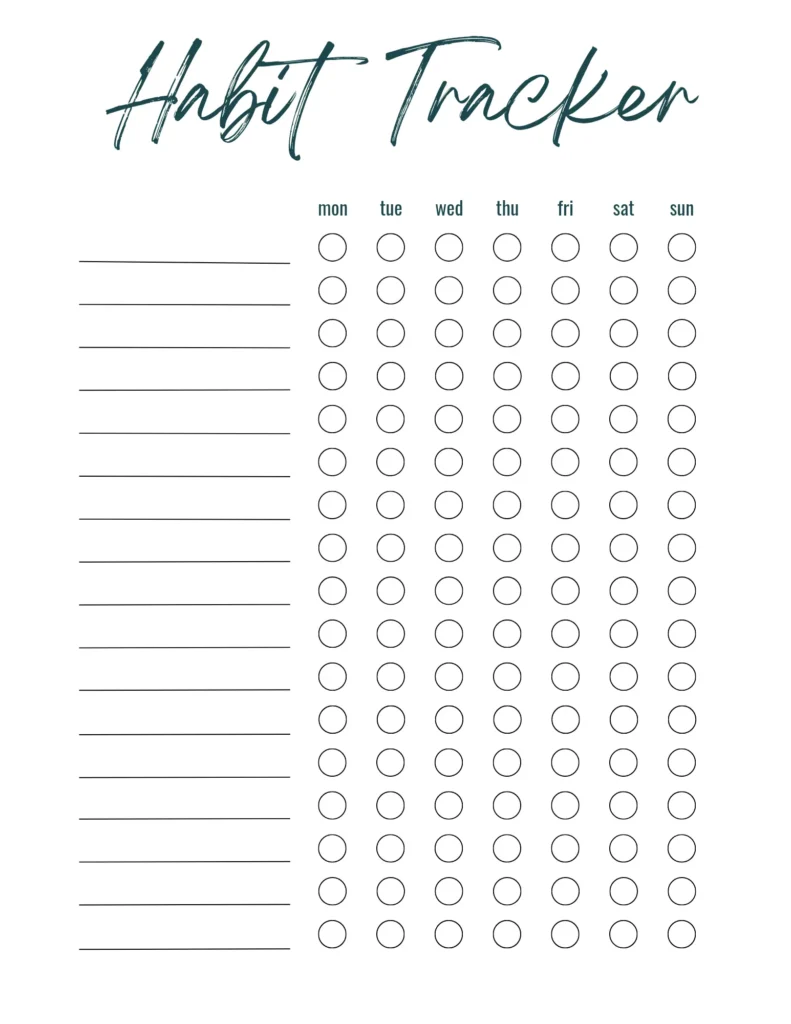
In this second category, you track your habits and routines based on your goals and ambitions. Here write down the habits you’re developing in your life and them in your journal.
Here are the two things you need to do:
- Tick your habit of you’re done
- Be honest about what you’re tracking
If you do this over time you’ll be able to build habits and also you can know what habits you are skipping on a daily basis. Like this you build habits.
Finance Management
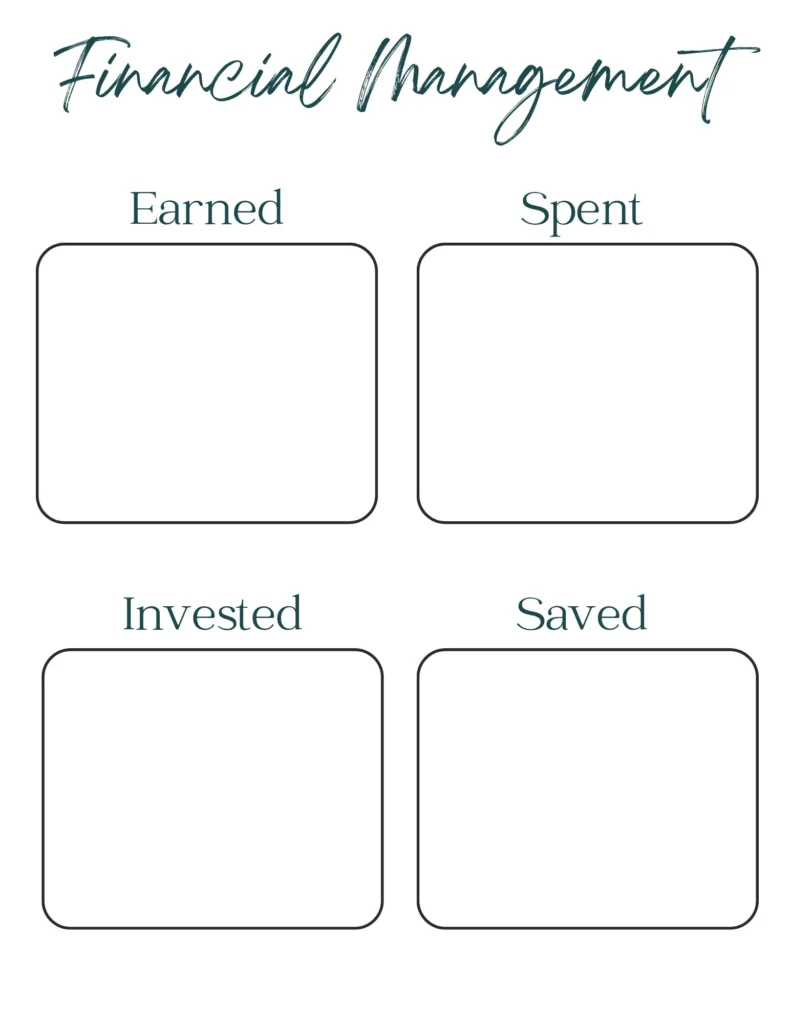
The money we spend on the things that we don’t need is more than the money we spend on our needs. This means we have poor finance management.
So to avoid wasting money on the things that you don’t need and to utilize the money for your real needs, we need to track how we are spending our money. This is why we have a finance management category in our journal.
You need to track these 4 major things in the money management category:
- Money Spent
- Money Earned
- Money Saved
- Money Invested
Before you sleep write down how much money you spent and how much you saved and the earned and Invested money can be calculated on a monthly basis.
After a month of tracking your money, you’ll know what you’re doing with your money and you need to cut your expenses if it seems you’re spending more.
And you need to maintain a balanced portfolio to manage money like a pro.
Daily Experience
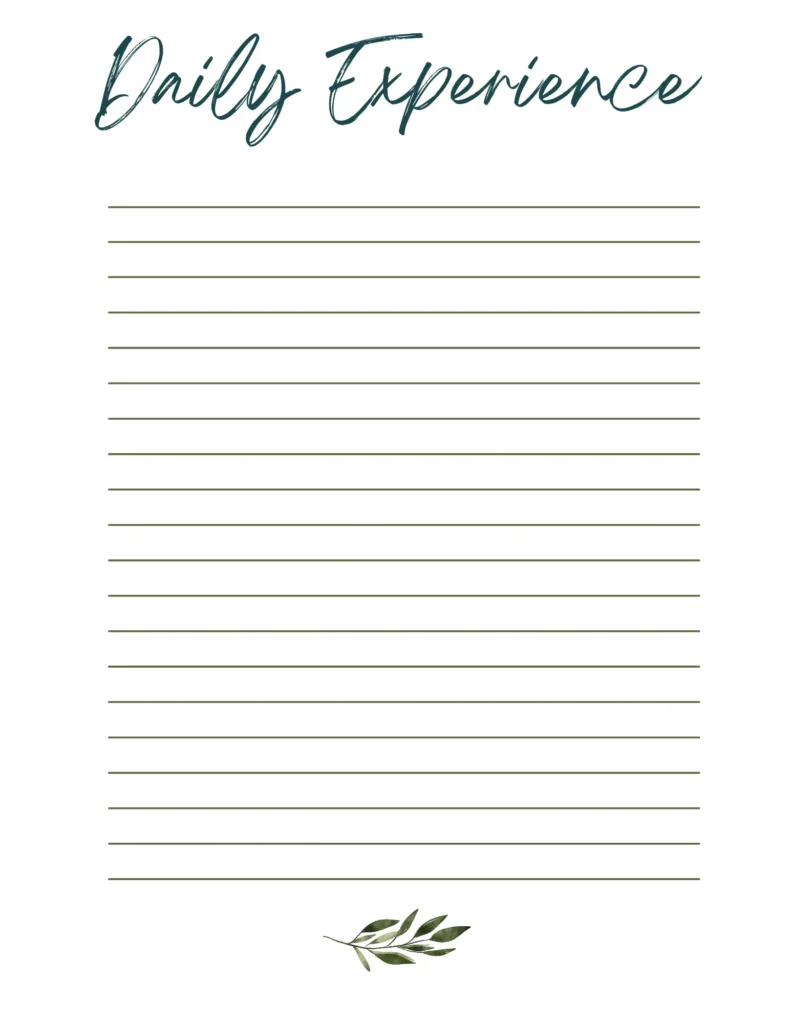
In this last category, you need to write the experience that you experienced throughout the day. This is usually written at night.
You need not write any 300 or 500-word essay. You are not writing any exam, you’re journaling your day of life.
You just need to write the thoughts, feelings, and things that you learned that day. You need not think so much about that, whatever important you felt that day, write it down.
The main purpose of doing this is to force your brain in digging deep into your brain and make your memorization stronger.
Everything has a science behind doing something, so whatever you do there’s always an outcome at the end.
project better life
3: Write Less, Cut Stuff
Writing a journal is not about how much you write. It’s more about quality over quantity. To write a journal you need to follow three rules:
- Never spend hours thinking about what to write
- Write what really means to you and which is useful to you
- Be real and be true to yourself
You need to write the journal less with more detail, cutting all the stuff that doesn’t matter a lot.
4: Morning Journal
As I mentioned you need to write four categories in your journal, now the first two categories you need to write in the morning. This is a morning journal.
In the affirmations category, you need to write one affirmation. Not only writing you need to visualize what you wrote and you need to believe what you’re writing.
Speak out loudly the affirmations at least 5-10 times by closing your eyes.
In the Habit Tracker category, you need to write down the habits that you’re building today and the tasks that you’ll be completing that day.
After your day ends you need to tick what habits you maintained consistently and what tasks you completed.
By doing this over a month, you know how much discipline you are on your goals.
5: Night Journal
The Finance Management and Daily Experience categories come under the night journal. You write these two categories before you sleep.
In the Finance Management category, you need to write your spending and savings (and every month’s end, you need to write your earnings and investments). Through this, you’ll be able to track your money and can reduce wastage of money.
In the Daily Experience category, you need to write the experience and thoughts that you feel are worth writing.
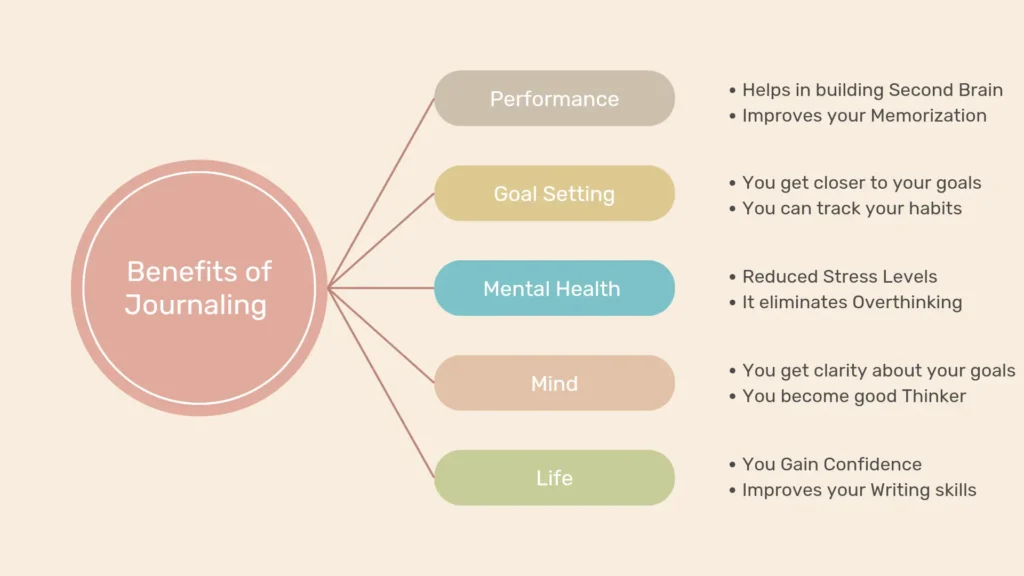
6: Track Your Habits
Just by writing habits, routines, and goals, you can’t become successful. You need to take action toward your goals. It means you need to track your habits and goals.
You need to measure how much you’re getting closer to your goals. And when you track, you know where you’re lacking and you can take some measures accordingly to correct them.
Tracking shows how disciplined you are in your goals. Moreover, it motivates you to break your limits and makes you work harder.
7: Make It Private
Journaling is entirely related to your personal experience and it needs not to be made public. The more private you make it, the more benefits you’ll get.
If you tell your goals, you’re telling your future plans to someone who may take advantage of your plans. And the probability of that goal converting into reality decreases.
Whatever you build in silence, that’ll make you unbreakable.
8: Write Your Goal
The main purpose of writing a journal is to achieve our burning desire. So you need to write the three major goals that you aim to achieve as follows:
- Main Primary Goal with BOLD letters
(Professional Goal means the one goal that you have a burning desire to achieve in your life no matter what happens) - Secondary Goal
(Usually your personal goal or your hobby that you want to master) - Third Goal
(For most people the third goal should be “Communication Mastery”, without which we can’t communicate with people effectively)
If you write these three goals on the first page of your journal, the moment you open your journal to write something, the first thing you’ll observe is your Goals.
So you’ll get reminded of your goals every day.
9: Be Honest
To write a journal you need to be honest to yourself. You need to be disciplined in such a way that you need to punish yourself if you fail to be honest with yourself.
Because if you’re not honest with yourself, maintaining a journal and spending a decent amount of time tracking everything is a total waste of time
Today’s work postponed to tomorrow, will be left pending for even months. And, if you cheat yourself today, you’ll stop tomorrow’s growth but if you punish yourself today, tomorrow you’ll live a great and honest life.
10: Analyse Journal
Don’t make your journal look messy and it also need not be maintained neatly. You need to write a journal in such a way that you understand whatever you wrote. And if it’s not understandable by others, it’s even better.
Try to analyze your journal on a weekly or monthly basis. Figure out what needs to be changed and what needs to be added further.
Read and visualize your goals every week from your journal to get the most out of it.
11: Observe The Pattern
To write a journal you need immense focus and attention to make that journal as real as possible. If you write a journal with honesty being your first priority then after a month of journaling you’ll observe a pattern.
The pattern may be as simple as your growth graph and as complex as building your second brain.
You observe some recurring and repeating patterns in your journal that’ll help in solving your life problems with more ease.
12: Just Start
To start a war you need armor, weapons, and empires but to write a journal you need nothing, except a book. So you need not prepare yourself to write a journal.
To write a journal you need patience and most importantly your interest in journaling your life.
So don’t think too much about anything and start writing a journal today.
Benefits of Maintaining A Journal
- You get closer to your goals
- You can track your habits
- Improve your Writing skills
- Improve your Memorization
- It helps in building the Second Brain
- You get clarity about your goals
- You become a good Thinker
- You Gain Confidence
- Reduced Stress Levels
- It eliminates Overthinking
Conclusion
To write a journal you need a lot of patience because you’ll start writing a journal anyhow but after a month of not seeing any results in journaling your life, you quit writing.
As I said it requires a lot of patience and you need to motivate yourself in writing a journal over months.
Because once you start observing the patterns and results from your journal, you see your life changing unbelievably.
And you say – “It’s worth writing a journal”.


